Blog
Surah Rahman PDF Download
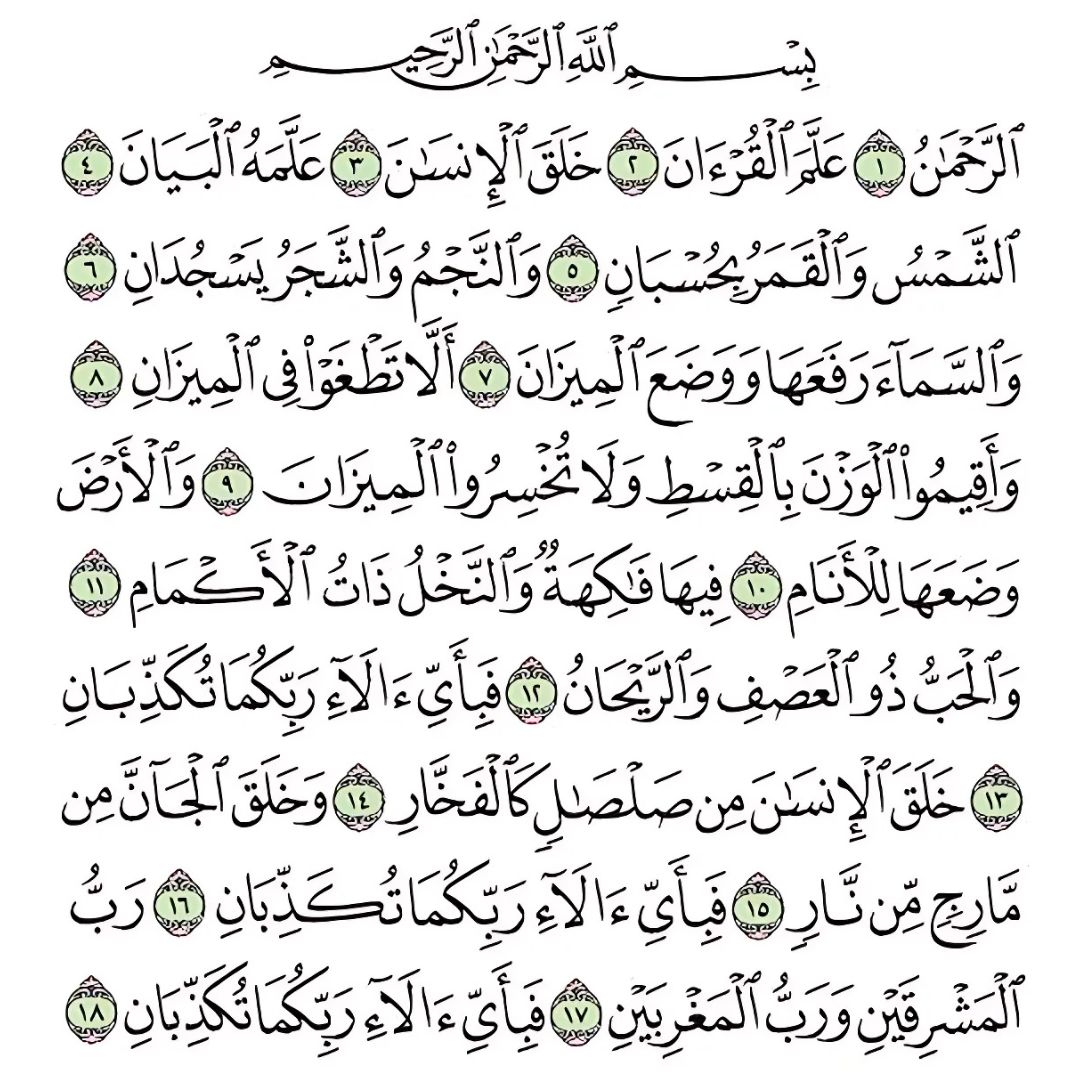
Introduction to Surah Rahman
Surah Rahman, often referred to as the “Beauty of the Quran,” is the 55th chapter of the Holy Quran. Comprising 78 verses (ayahs), it is one of the most loved and recited Surahs by Muslims worldwide. The Surah is named after “Ar-Rahman”, one of the 99 names of Allah, which translates to “The Most Merciful”.
This Surah holds a unique place in Islamic teachings due to its poetic rhythm, repetitive phrases, and powerful spiritual messages. Its verses touch the heart, reminding mankind and jinn of the innumerable blessings bestowed by Allah, while urging reflection and gratitude.
Context and Revelation
Surah Rahman is classified as a Medinan Surah by some scholars and Makkan by others. The subject matter, however, is universal, addressing both humans and jinn directly. It emphasizes divine generosity, accountability, and the eternal contrast between reward and punishment.
Its poetic beauty has been so widely praised that the Prophet Muhammad (PBUH) once said:
“Everything has an adornment, and the adornment of the Quran is Surah Ar-Rahman.”
(Bayhaqi in Shu’ab al-Iman)
Structure of Surah Rahman
One of the distinctive features of Surah Rahman is the recurring verse:
“فَبِأَيِّ آلَاءِ رَبِّكُمَا تُكَذِّبَانِ”
“Then which of the favors of your Lord will you deny?”
This verse appears 31 times throughout the Surah, creating a rhythmic and reflective tone that draws the listener into deeper contemplation. It is as though Allah is continuously challenging the reader or listener to deny any of His countless blessings.
Summary of Themes
Let’s explore the major themes of Surah Rahman in detail:
1. The Infinite Mercy of Allah
The Surah opens with the powerful name Ar-Rahman, emphasizing Allah’s boundless mercy that encompasses all of creation. This is a reminder that all blessings—spiritual and material—come from His mercy.
2. The Gifts to Humanity
Verses in the beginning mention the creation of man, the teaching of eloquent speech, and the balance of the universe. These are some of the countless signs of Allah’s generosity to mankind.
“الرحمن، علم القرآن، خلق الإنسان، علمه البيان”
“The Most Merciful, Taught the Qur’an, Created man, [And] taught him eloquence.” (55:1-4)
3. The Cosmic Order
The Surah beautifully describes the harmony in the sun, moon, stars, and oceans, all following precise calculations. This showcases divine control over the universe.
“الشمس والقمر بحسبان، والنجم والشجر يسجدان”
Everything in creation submits to Allah, indicating a perfect divine system.
4. Blessings of Earth
Allah highlights the natural resources—fruits, grains, dates, and aromatic plants—reminding us of the beauty and utility of nature. The Surah points out that these are not man-made, but divine favors.
5. The Dual Creation: Humans and Jinn
Surah Rahman addresses both humans and jinn, reminding them that they will be held accountable for the blessings they enjoyed in this world.
“سَنَفْرُغُ لَكُمْ أَيُّهَا الثَّقَلَانِ”
“We will attend to you, O prominent beings [humans and jinn]!” (55:31)
6. Punishment of the Guilty
The Surah provides a vivid depiction of Hell as a warning to those who deny Allah’s signs. The descriptions are meant to evoke fear and realization among those who are heedless.
7. Rewards of the Righteous
On the flip side, the Surah concludes with stunning imagery of Paradise, portraying two gardens for the believers. These gardens are described in detail—full of shade, flowing springs, fruits, reclining couches, and purified spouses.
This dual presentation of divine justice is meant to motivate believers toward righteousness and gratitude.
Spiritual Benefits of Surah Rahman
Many Islamic scholars and spiritual healers have spoken about the healing and calming effects of Surah Rahman. Regular recitation is said to provide:
- Emotional relief for anxiety and depression
- Physical healing from chronic ailments (when recited with belief and prayer)
- Spiritual cleansing, promoting inner peace and divine connection
- Increased gratitude, by contemplating the countless favors of Allah
It’s no surprise that in many hospitals and healing centers in Muslim countries, Surah Rahman is played to promote peace and hope among patients.
Why Surah Rahman is Called the “Beauty of the Quran”
Surah Rahman is often described as the most beautiful chapter of the Quran due to:
- Repetition for emphasis: The recurring verse “Then which of the favors of your Lord will you deny?” enhances the memorability and impact of the message.
- Balance of fear and hope: The Surah speaks of both punishment and reward, appealing to human emotions and conscience.
- Poetic and rhythmic flow: The verse structure creates a soothing and immersive auditory experience, even for non-Arabic speakers.
- Universal relevance: The message of gratitude and divine favors is timeless and applicable to every generation.
Surah Rahman in Hadith
While not all narrations about Surah Rahman are found in the most authentic collections, many scholars mention its virtue and impact based on practice and experience. For instance, it is reported:
“The Prophet (PBUH) recited Surah Rahman to his companions, and when he reached the verse, ‘Which of the favors of your Lord will you deny?’, they remained silent. So he said: ‘I was reciting it to the jinn, and their response was better than yours. Whenever I reached the verse, they said: None of Your favors do we deny, our Lord! All praise is due to You.’”
(Tirmidhi)
Surah Rahman and Healing
In contemporary times, many spiritual practitioners advocate listening to Surah Rahman for relief from emotional and physical distress. While it should never replace medical treatment, its impact as a form of ruqyah (spiritual healing) is widely acknowledged.
Ways to Incorporate Surah Rahman:
- Daily recitation after Fajr for barakah
- Listening during illness or treatment
- Reading it on water and drinking for healing (a practice used in ruqyah)
- Playing in homes to bring peace and divine protection
Surah Rahman in Urdu, English & PDF Format
To make the message of Surah Rahman accessible to everyone, it’s available in multiple languages including Urdu and English translations. These translations allow non-Arabic speakers to deeply reflect on the meanings and messages.
If you wish to download Surah Rahman in PDF format, whether in Arabic script, with Urdu translation, or English transliteration, you can easily do so from trusted Islamic platforms.
Tips for Memorizing Surah Rahman
- Listen repeatedly: Its rhythmic verses make it easy to memorize by listening regularly.
- Break it into sections: Divide the Surah into 3-4 parts and memorize daily.
- Focus on the recurring verse: Since “فَبِأَيِّ آلَاءِ رَبِّكُمَا تُكَذِّبَانِ” appears repeatedly, it becomes a natural anchor.
- Understand the meaning: When you reflect on the message, memorization becomes easier and more heartfelt.
Surah Rahman for Children
Children can greatly benefit from learning and understanding Surah Rahman:
- It builds gratitude from an early age
- Its melodic tone makes it engaging
- Lessons of reward and accountability are foundational to Islamic teaching
Make it a habit to play Surah Rahman during bedtime or after prayer to help children absorb its beauty naturally.
Frequently Asked Questions (FAQs)
1. What is Surah Rahman about?
Surah Rahman speaks about Allah’s mercy, the blessings He has provided, and the accountability of mankind and jinn. It contrasts the rewards of the righteous with the punishments of the ungrateful.
2. How many times is “Which of the favors of your Lord will you deny?” mentioned?
This verse is repeated 31 times throughout the Surah.
3. Is Surah Rahman effective for healing?
Many people listen to Surah Rahman for spiritual and emotional healing. While not a substitute for medical treatment, it’s considered effective as a complementary spiritual practice.
4. Can non-Arabic speakers benefit from Surah Rahman?
Absolutely. Listening, reading translations, and reflecting on the meanings can offer deep spiritual and emotional benefits.
Conclusion
Surah Rahman is more than just a chapter of the Quran—it is a divine symphony that beautifully summarizes the generosity, balance, justice, and mercy of Allah. Its message is universal and timeless, reminding both humans and jinn of the Creator’s countless favors and the accountability of our actions.
The rhythmic repetition, spiritual depth, and poetic beauty make it an essential Surah to reflect upon regularly. Whether you are seeking healing, peace, or a deeper connection with Allah, Surah Rahman offers a path to divine reflection and transformation.
📥 Download Surah Rahman PDF Now
To read and reflect on Surah Rahman anytime, we invite you to download the Surah Rahman in PDF format, including Arabic text with Urdu and English translations.
👉 Click here to download now from SurahRehman.com
Embrace the mercy of Allah. Reflect, recite, and remember — Which of the favors of your Lord will you deny?
Blog
Dua e Qunoot
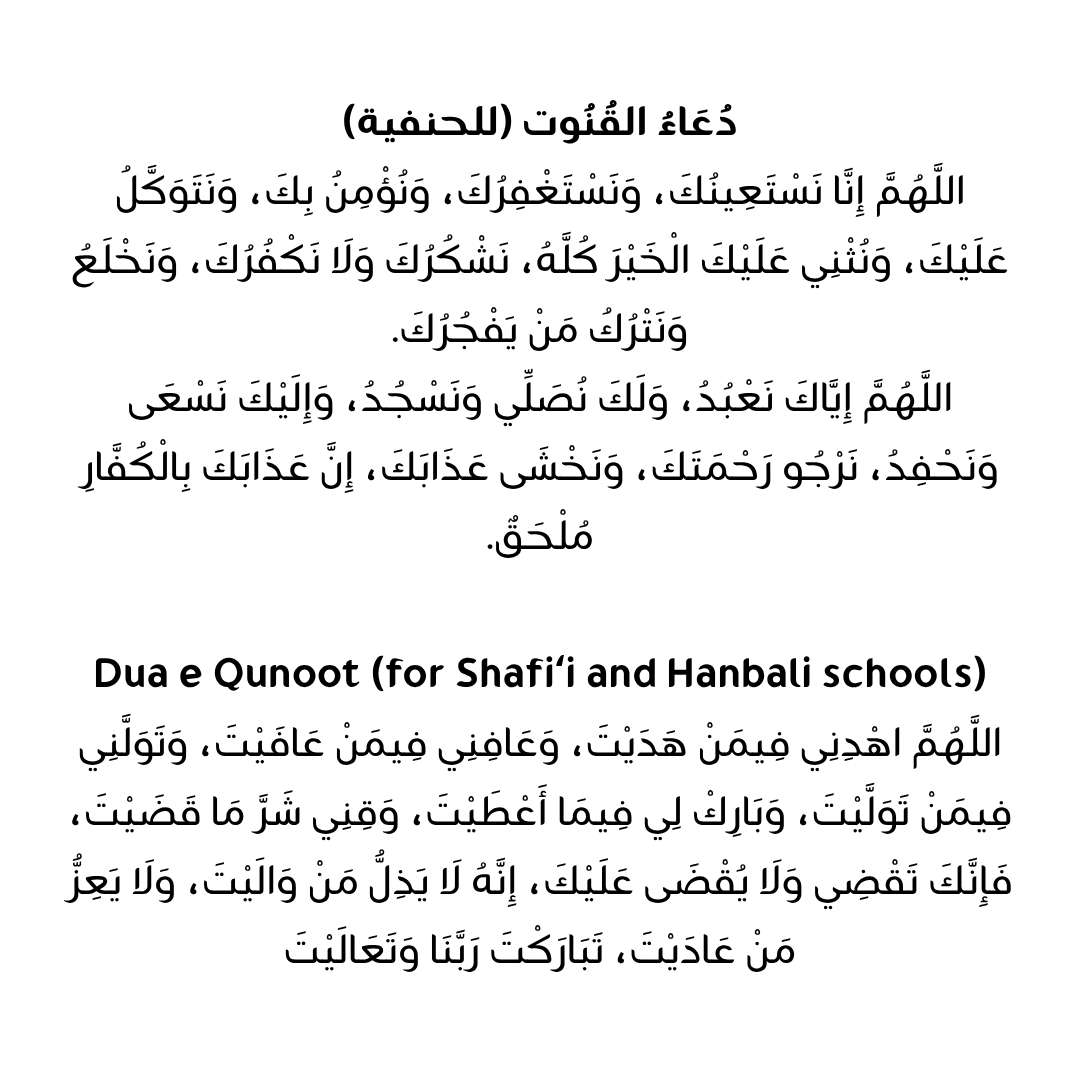
Prayer (salah) is the pillar of a Muslim’s daily life spiritually. Amongst its unique elements is Dua e Qunoot, an earnest supplication recited during the Witr prayer, and sometimes in other prayers in situations of communal distress. So Qunoot is a symbol of submission, humility, and trust in Allah Almighty.It invokes the meanings of protection, forgiveness, and guidance, which are ever-relevant for Muslims through generations.
In this article, the reader will get an overview of the dua, i.e,its meaning, Arabic text with translation, its significance in different Fiqhi schools, reason for its recitation, tips for memorizing, and its spiritual benefits and gains.
What Does “Qunoot” Mean?
The Arabic term Qunoot is full of meanings. Linguistically, it may be interpreted as:
- Remaining silent and not talking.
- Remaining humble while standing in prayer.
- Obedience and submission to Allah.
- Extension of the standing posture of ṣalah.
- Sincerely asking from Allah in prayer.
Based on these definitions, it is apparent that Qunoot is a condition of full submission, standing before Allah in humility, obedience, prayer, and stillness of heart. Therefore, the unique dua offered in this stance is named Dua e Qunoot.
The Arabic Text of Dua e Qunoot
Dua e Qunnoot has two widely famous versions. One is commonly recited in the Hanafi school, while the other is recited in the other jurisprudences.
1. The Popular Hanafi Version
Arabic Text:
اللَّهُمَّ إِنَّا نَسْتَعِينُكَ وَنَسْتَغْفِرُكَ وَنُؤْمِنُ بِكَ وَنَتَوَكَّلُ عَلَيْكَ وَنُثْنِي عَلَيْكَ الْخَيْرَ وَنَشْكُرُكَ وَلَا نَكْفُرُكَ وَنَخْلَعُ وَنَتْرُكُ مَنْ يَفْجُرُكَ. اللَّهُمَّ إِيَّاكَ نَعْبُدُ وَلَكَ نُصَلِّي وَنَسْجُدُ وَإِلَيْكَ نَسْعَى وَنَحْفِدُ وَنَرْجُو رَحْمَتَكَ وَنَخْشَى عَذَابَكَ إِنَّ عَذَابَكَ بِالْكَافِرِينَ مُلْحِقٌ.
Translation:
“O Allah! We need your assistance and forgiveness. We believe in You and depend upon You. We extol You with the finest form of praise, we thank You and are not unthankful to You. We turn away from and leave the disobedient. O Allah! You alone we worship, to You alone we pray and prostrate, and to You we strive and hasten.” We hope for Your mercy and fear Your punishment. Truly, Your punishment catches up with the disbelievers.”
2. The Shafi‘i & Widely Accepted Version
Arabic Text:
اللَّهُمَّ اهْدِنِي فِيمَنْ هَدَيْتَ، وَعَافِنِي فِيمَنْ عَافَيْتَ، وَتَوَلَّنِي فِيمَنْ تَوَلَّيْتَ، وَبَارِكْ لِي فِيمَا أَعْطَيْتَ، وَقِنِي شَرَّ مَا قَضَيْتَ، فَإِنَّكَ تَقْضِي وَلَا يُقْضَى عَلَيْكَ، وَإِنَّهُ لَا يَذِلُّ مَنْ وَالَيْتَ، وَلَا يَعِزُّ مَنْ عَادَيْتَ، تَبَارَكْتَ رَبَّنَا وَتَعَالَيْتَ.
Translation:
“O Allah, guide me among those You have guided, bestow upon me health among those You have granted health, befriend me among those You have befriended, bless me in what You have given, and save me from the evil of what You decreed. Indeed, You decree and none can decree over You. Surely, the one You befriend is not disgraced, and the one You oppose is not honored. Blessed are You, our Lord, and Exalted.”
When is Dua e Qunnoot Recited
1.Inwitr prayer
It is Sunnah to recite Dua e Qunoot in the final Rakah of Witr, after surah Al fatiha and another surah, before entering the ruku, and this is the most prevalent practice amongst Muslims globally.
2. During Times of Calamity
The Prophet ﷺ recited Qunoot in other prayers as well in times of extreme difficulties for the Muslim community. For example, when calamities happen or when Muslims are oppressed by enemies, the Prophet recited Qunoot in congregational prayers, requesting Allah’s help.
3. Difference in Madhahib( JurisprudentialSchools of Thought):
Hanafi: Dua e Qunoot is only recited in Witr. In calamities, it is also allowed in other prayers.
Maliki: They recite Qunoot in Fajr on a regular basis, not in Witr.
Shafai:Qunoot in witr is only recited in Ramadan; otherwise, in ordinary days, it is recited in fajr prayer.
Hanbali: their position is similar to the Hanafisi.e they recite it in witr, but in the situation of crisis, it can also be extended.
Why Recite Dua e Qunoot?
Dua e Qunoot is more than just a ritual as it has spiritual and practical benefits.
1. Admission of Human Weakness:
It reminds us that all power and capability is from Allah, and we are always in need of His assistance.
2. Seeking Forgiveness from Allah:
Qunoot includes directly asking Allah for forgiveness, and as repentance purifies the heart, and results in generating peace.
3. Protection from Evil:
Both versions request protection from harm and calamities from Allah, something every believer wishes for in an insecure world.
4.Increase in Tawakkul on Allah SWT:
When one says in the Dua “Oh Allah! I rely on you”, it shows that the believer is completely relying on Allah.
5.spirituality and humility:
Making Dua to Allah in the Salah acts as a source to enhance Surrender and submission to the will of Allah Almighty.
Importance and impact of Dua e Qunoot in daily life
Peace of Mind: Repeatedly asking Allah for assistance gives peace of mind from worries and distress.
Symbol of Unity of the ummah: when it is recited in congregation it unifies and brings Muslims together.
Moral Compass: It reminds believers to dissociate from those who disobey Allah and to stand firm in the face or trials.
Connection and closeness with Allah: Daily recitation forms into Habbit and deepens the spiritual connection between the servant and the Master.
Guidance and Mercy : The prayer petitions directly for guidance, which is the greatest blessing a Muslim can receive.
Some tips for memorizing Dua e Qunoot
Dua e Qunoot may appear to be hard to learn among beginners, and with effort, it becomes simple.
1. Split It into Parts: Learn some words (2-3) at a time and then link them.
2. Audio Recitations: Qaris and Videos online may assist in correct pronunciation and rhythms.
3. Write It Down: Writing consists of using memory and strengthening learning.
4. Practice in Prayer: The most effective method of memorizing is performing it often in Witr.
5. Teach Others: You can share it with your friends or family to ensure it sticks in your mind.
Other Supplications in case you forget.
When a person forgets Dua e Qunoot in Witr, he may repeat any other brief dua found both in the Quran and the Sunnah. For example:
Rabbanaaatina fid-dunyahasanatanwa fil-akhiratihasanatanwaqinaadhaban-nar.
(Our Lord! Wealthy to us in this world and Wealthy to us in the Hereafter, And safe us of the Fire.)
“Allahummaghfirli.”
(O Allah, forgive me.)
These options represent the forgiveness of Islam: The point is to turn to Allah, not to absolutely memorize one text.
The Dua e Qunoot in the month of Ramadan.
Witr prayers are normally carried out in congregation during Ramadan after Tarawih. Dua e Qunoot is pronounced in this environment where the imam speaks and the congregation answers with Amin. It is a very spiritual mood, hundreds of Muslims pleading with one soul to Allah.
Different Versions of Dua e Qunoot.
It should be mentioned that both significant versions of Dua e Qunoot are genuine. Qunoot by the Prophet ﷺ himself was made in various ways, and the slight differences were reported by companions. Therefore, researchers are in agreement that both are acceptable. Each of the two versions can and should be recited by a Muslim, depending on what he has heard.
The Further Spiritual Importance of Dua e Qunoot
Among the most outstanding things about Dua e Qunoot is its ability to change the inner world of the believer as he or she prays. Qunoot is part of ṣalawh, the most sacred thing in Islam as opposed to other supplications which may be recited at any time. This adds to its significance as the believer is already in a purification state, he is facing the qiblah, and standing in front of Allah with full concentration.
Qunoot is not only said at that point, but it is experienced in the heart. By repeating such words as We seek Your help, and we believe in You or Guide us among those You have guided the Muslim does not repeat a formula, but states their reliance on Allah with sincerity.
In the past, Qunoot has been invoked by Muslims in some of the most challenging times in their lives: when the Prophet ﷺ was praying to the weak, when communities requested protection against disaster, and when Muslims all united to seek strength in times of war or famine.
The practice is still present today, with numerous mosques having imams reciting Qunoot with fervor during Ramadan or during international crises that touch the Ummah. On the spiritual level, it teaches Muslims to share their struggles that a single believer suffering in adversity becomes the worry of everybody, and they all lift their hands in prayer.
It can be a humble experience and can bring whole congregations to tears, emotionally. At a personal level, the sanctity of the recitation provides inner peace to the reciter, renewed faith, and a closer relationship with Allah. Therefore, Dua e Qunoot is not merely a supplication, but it is a linkage between the heart of the believer and the mercy of God, not only in his or her solitude, but also in the cohesiveness of the community.
FAQs About Dua e Qunoot
1. Is Dua e Qunoot obligatory?
No, it is Sunnah (recommended). Leaving it out does not nullify prayer; however, the recitation is very gratifying.
2. Would I be able to read it on paper when I have not memorized it?
Yes, most of all learning. Gradually, practice memorizing it so that it can be recited more easily.
3. Are women also able to recite Dua e Qunoot?
Absolutely. The guide cuts across both men and women in their Witr prayers.
4. Should I raise my hands when reciting Qunoot?
Yes, the Sunnah is to raise the hands during Qunoot in supplication but there are schools which differ.
5. Is Dua e Qunoot only for Witr?
Yes, but in times of calamities it may be said also in other obligatory prayers.
6. To what extent shall I do in case I commit errors during reciting Qunoot?
Errors will not nullify the prayer. You can either correct or proceed, since Allah understands what you are up to.
7. Is it possible to recite Can Dua e Qunoot in my language?
The original Arabic text is desired, but when one has not memorized it yet, he or she can pray using his own language, particularly when not in the prayer hall.
8. Which is better to recite Qunoot in silence or aloud?
When alone in prayer, you can say it either silently or in low tones. During congregation, the imam tends to recite it aloud, and the people answering him with Amamin.
9. Is it possible to teach children Dua e Qunoot at an early age?
Yes, it is better taught at a young age so that it can be easily memorized and it creates spiritual habits that are known forever.
10. Is there anything wrong with repeating both versions of Qunoot one right after the other?
No, they are both legitimate and legal. Alternating between them makes one more familiar with the Sunnah and adds more value to his or her prayer life.
Conclusion
Dua e Qunoot is a gateway to spiritual closeness with Allah. The version you recite, be it the Hanafi version or the Shafi version or any other version that is acceptable, it all comes down to the same thing, which is to seek guidance, forgiveness, protection, and mercy of Allah.
It is a dua that consolidates our connection with Allah, hardens our hearts amidst the toughness and reminds us of our dependence on Him in every part of life. Dua e Qunoot is a gem that can never be overlooked by Muslims who need to find a means of beautifying their prayers at night.
It you have not yet learnt, begin today. Just learn it step by step, use it in your prayer during Witr, and make it a regular aspect of your spiritual life. In shahada Allah, it is you who will experience peace, humility, and a closer relationship with Allah through it.
Blog
Taught the Qur’an عَلَّمَ الْقُرْآنَ

Bismillahir Rahmanir Raheem — In the name of Allah, the Most Gracious, the Most Merciful.
The Quran: A Manifestation of Divine Mercy
It is clearly stated in the Holy Quran, particularly in Surah Ar-Rahman (55:2):
“عَلَّمَ الْقُرْآنَ”
“He taught the Qur’an.”
This verse highlights one of the greatest blessings from Allah (سُبْحَانَهُ وَتَعَالَى) — the teaching and revelation of the Quran. It is not just a holy book but a complete code of life and a divine guide for all of humanity until the Day of Judgment.
The Quran: The Eternal Guide for Muslims
The Quran has been the only source of divine guidance for Muslims for over 1,400 years. It addresses every aspect of life — from worship and family matters to social justice, ethics, and governance. If Muslims begin to read, reflect, and act upon the Quranic guidance, they will find a clear and beneficial direction in both worldly and spiritual matters.
The Prophets Followed the Quran with Utmost Obedience
When the Quran was revealed to the Prophet Muhammad ﷺ, it came verse by verse as per divine wisdom. Every prophet before him, such as Musa (Moses), Isa (Jesus), and Ibrahim (Abraham), received divine revelations that were meant to guide their respective nations. The Prophet Muhammad ﷺ not only received the final revelation but also lived by it, setting an example for the entire ummah.
The Quran Remains Protected by Allah Himself
Unlike the scriptures of other religions, which have been altered, edited, or lost, the Quran remains unchanged and preserved. Allah says in Surah Al-Hijr (15:9):
“Indeed, it is We who sent down the Qur’an and indeed, We will be its guardian.”
This divine promise ensures that the Quran will remain unaltered, pure, and authentic until the end of time.
False Books and Misguidance from Other Sources
Throughout history, numerous texts have claimed to be divine, spiritual, or sources of enlightenment. Many of these, including altered religious books or texts like the so-called Satanic Bible, are man-made deceptions. They mislead people with philosophies that go against human nature, logic, and divine truth. These books often promote falsehoods, black magic, and spiritual corruption, written with the influence of Satan and dark forces to lead people astray.
Allah has clearly warned against such false books and teachings. Any book that contradicts the Quran is not a source of divine guidance. The Quran remains the only scripture directly from Allah, preserved in its original language and recited by millions daily.
Quran and Hadith: The True Way of Life
The Quran, along with the authentic Hadith of the Prophet ﷺ, offers a complete blueprint for a successful life and the hereafter. From the moment we are born to the time we leave this world, the Quran provides:
- Purpose of life
- Moral and ethical conduct
- Guidance in relationships
- Clarity on worship and beliefs
- Preparation for the Hereafter
Conclusion: Quran is the Only True Book of Guidance
As Muslims, we must understand that the Quran is not just a book — it is the Word of Allah, a miracle, and a mercy. It has remained untouched, uncorrupted, and preserved for centuries. It is a light for those who seek truth, a shield against misguidance, and a path leading straight to Jannah (Paradise).
Let us reconnect with the Quran. Let us read it, understand it, and implement its teachings in our daily lives — for true success lies in following the guidance of Al-Quran and the Sunnah of Prophet Muhammad ﷺ.
Blog
Can Jinn Enter Paradise? Quranic Explanation from Surah Ar-Rahman

One of the most frequently asked questions among Muslims is: Can jinn (jeens) enter Paradise? The answer is yes, and it is clearly mentioned in the Holy Qur’an, especially in Surah Ar-Rahman, which sheds light on the fate of both humans and jinn.
Misconceptions About Jinn
Many people believe jinn are only evil, scary beings who harm humans. While it’s true that some jinn can possess or harm humans—especially those who follow Satan (Shaytan) and practice black magic—not all jinn are bad. Just like humans, jinn are also divided into Muslims and non-Muslims, righteous and wicked, and believers and disbelievers.
Jinn Also Follow Religions Like Humans
According to Islamic belief, jinn are intelligent beings created from smokeless fire, as stated in the Quran (Surah Al-Hijr 15:27). They have free will, meaning they can choose to believe or disbelieve, just like humans.
“And I did not create the jinn and mankind except to worship Me.”
— (Surah Adh-Dhariyat 51:56)
Some jinn follow Islam, perform salah (prayers), recite the Qur’an, and live righteous lives. Others follow different beliefs or even serve evil purposes.
Surah Ar-Rahman: Clear Mention of Jinn Entering Paradise
One of the most beautiful Surahs in the Qur’an is Surah Ar-Rahman, which addresses both humans and jinn directly with the repeated verse:
“Which of the favors of your Lord will you deny?”
— (Surah Ar-Rahman 55:13 and repeated throughout)
Later in Surah Ar-Rahman, Allah clearly describes the rewards of Paradise (Jannah) for those who do good, and addresses jinn and humans equally:
“But for he who has feared the position of his Lord are two gardens.”
— (Surah Ar-Rahman 55:46)
And in verse 56:
“In them are women limiting [their] glances, untouched before them by man or jinn.”
— (Surah Ar-Rahman 55:56)
This verse proves that jinn can enter Paradise, because Allah says that the women of Paradise have not been touched by humans or jinn, implying that jinn, like humans, will also be rewarded with Paradise if they were righteous.
The Fate of Good and Evil Jinn
Just like humans:
- Muslim jinn who live righteous lives and follow Islam will be rewarded with Jannah (Paradise).
- Disbelieving or evil jinn who practice black magic, harm others, or follow Shaytan will face punishment in Jahannam (Hell).
This balance of reward and punishment is confirmed in Surah Al-Jinn (72:14):
“And among us are Muslims [in submission to Allah], and among us are the unjust. And whoever has become Muslim – those have sought out the right course.”
Conclusion: Yes, Jinn Can Enter Paradise
Based on authentic Quranic evidence, it is clear that jinn will be judged just like humans on the Day of Judgment. They will enter either Paradise or Hell depending on their beliefs and deeds.
So, the next time someone asks, “Can jinn go to Paradise?” — the answer is a firm yes, supported by Surah Ar-Rahman and other Qur’anic verses.
-

 Prayers7 months ago
Prayers7 months agoHow to Build a Deep Spiritual Connection with Allah
-

 Hajj4 months ago
Hajj4 months agoHajj 2026 – Guide, Packages, Dates, and Preparation for the Sacred Journey
-

 Blog12 months ago
Blog12 months agoSurah Rehman
-
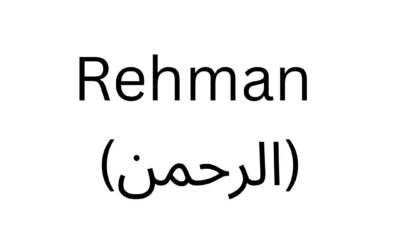
 Blog4 months ago
Blog4 months agoThe Most Merciful – Rehman (الرحمن)
-
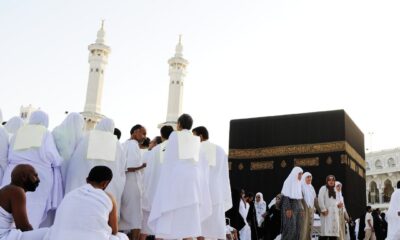
 Umrah4 months ago
Umrah4 months agoUmrah 2026 – A Complete Guide to Perform the Spiritual Journey
-

 Blog4 months ago
Blog4 months agoTaught the Qur’an عَلَّمَ الْقُرْآنَ
-
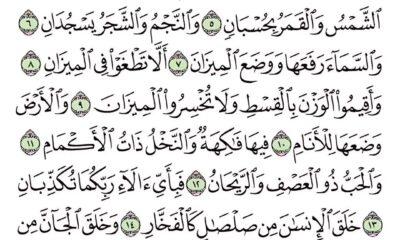
 Blog4 months ago
Blog4 months agoSurah Al Rehman
-

 Blog6 months ago
Blog6 months agoRevelation (Wahi) and Its Reality
